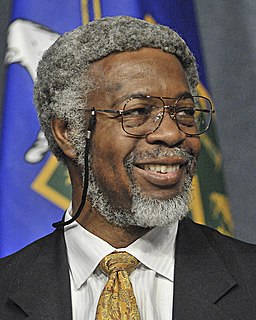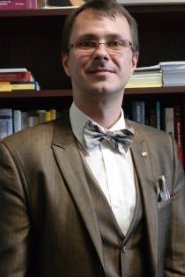
The Big Bang theory describes how the universe expanded from an initial state of high density and temperature. It is the prevailing cosmological model explaining the evolution of the observable universe from the earliest known periods through its subsequent large-scale form. The model offers a comprehensive explanation for a broad range of observed phenomena, including the abundance of light elements, the cosmic microwave background (CMB) radiation, and large-scale structure.

In physical cosmology, cosmic inflation, cosmological inflation, or just inflation, is a theory of exponential expansion of space in the early universe. The inflationary epoch lasted from 10−36 seconds after the conjectured Big Bang singularity to some time between 10−33 and 10−32 seconds after the singularity. Following the inflationary period, the universe continued to expand, but at a slower rate. The acceleration of this expansion due to dark energy began after the universe was already over 7.7 billion years old.
The holographic principle is a tenet of string theories and a supposed property of quantum gravity that states that the description of a volume of space can be thought of as encoded on a lower-dimensional boundary to the region — such as a light-like boundary like a gravitational horizon. First proposed by Gerard 't Hooft, it was given a precise string-theory interpretation by Leonard Susskind, who combined his ideas with previous ones of 't Hooft and Charles Thorn. Leonard Susskind said, “The three-dimensional world of ordinary experience––the universe filled with galaxies, stars, planets, houses, boulders, and people––is a hologram, an image of reality coded on a distant two-dimensional (2D) surface." As pointed out by Raphael Bousso, Thorn observed in 1978 that string theory admits a lower-dimensional description in which gravity emerges from it in what would now be called a holographic way. The prime example of holography is the AdS/CFT correspondence.

The multiverse is a hypothetical group of multiple universes. Together, these universes comprise everything that exists: the entirety of space, time, matter, energy, information, and the physical laws and constants that describe them. The different universes within the multiverse are called "parallel universes", "other universes", "alternate universes", or "many worlds".

Hawking radiation is black body radiation that is theorized to be released outside a black hole's event horizon because of relativistic quantum effects. It is named after the physicist Stephen Hawking, who developed a theoretical argument for its existence in 1974. Hawking radiation is a purely kinematic effect that is generic to Lorentzian geometries containing event horizons or local apparent horizons.

Max Erik Tegmark is a Swedish-American physicist, cosmologist and machine learning researcher. He is a professor at the Massachusetts Institute of Technology and the president of the Future of Life Institute. He is also a scientific director at the Foundational Questions Institute, a supporter of the effective altruism movement, and has received research grants from Elon Musk to investigate existential risk from advanced artificial intelligence.

In general relativity, a white hole is a theoretical region of spacetime and singularity that cannot be entered from the outside, although energy-matter, light and information can escape from it. In this sense, it is the reverse of a black hole, which can be entered only from the outside and from which energy-matter, light and information cannot escape. White holes appear in the theory of eternal black holes. In addition to a black hole region in the future, such a solution of the Einstein field equations has a white hole region in its past. This region does not exist for black holes that have formed through gravitational collapse, however, nor are there any observed physical processes through which a white hole could be formed.

Michio Kaku is an American theoretical physicist, futurist, and popularizer of science. He is a professor of theoretical physics in the City College of New York and CUNY Graduate Center. Kaku is the author of several books about physics and related topics and has made frequent appearances on radio, television, and film. He is also a regular contributor to his own blog, as well as other popular media outlets. For his efforts to bridge science and science fiction, he is a 2021 Sir Arthur Clarke Lifetime Achievement Awardee.

Brane cosmology refers to several theories in particle physics and cosmology related to string theory, superstring theory and M-theory.

The characterization of the universe as finely tuned suggests that the occurrence of life in the universe is very sensitive to the values of certain fundamental physical constants and that the observed values are, for some reason, improbable. If the values of any of certain free parameters in contemporary physical theories had differed only slightly from those observed, the evolution of the Universe would have proceeded very differently and life as it is understood may not have been possible.
The chronology protection conjecture is a hypothesis first proposed by Stephen Hawking that laws of physics beyond those of standard general relativity prevent time travel on all but microscopic scales - even when the latter theory states that it should be possible. The permissibility of time travel is represented mathematically by the existence of closed timelike curves in some solutions to the field equations of general relativity. The chronology protection conjecture should be distinguished from chronological censorship under which every closed timelike curve passes through an event horizon, which might prevent an observer from detecting the causal violation.

Horizon is an ongoing and long-running British documentary television series on BBC Two that covers science and philosophy.

Sylvester James Gates Jr., known as S. James Gates Jr. or Jim Gates, is an American theoretical physicist who works on supersymmetry, supergravity, and superstring theory. He retired from the physics department and Center for Fundamental Physics at the University of Maryland College of Computer, Mathematical, and Natural Sciences in 2017, and he is now the Brown Theoretical Physics Center Director, the Ford Foundation Professor of Physics, Affiliate Professor of Mathematics, and Watson Institute for International and Public Affairs Faculty Fellow at Brown University. He was a University of Maryland Regents Professor and served on former President Barack Obama's Council of Advisors on Science and Technology.
Parallel universe may refer to:

Laura Mersini-Houghton is an Albanian-American cosmologist and theoretical physicist, and professor at the University of North Carolina at Chapel Hill. She is a proponent of the multiverse hypothesis and the author of a theory for the origin of the universe that holds that our universe is one of many selected by quantum gravitational dynamics of matter and energy. Predictions of her theory have been successfully tested by astrophysical data. She argues that anomalies in the current structure of the universe are best explained as the gravitational tug exerted by other universes.

Parallel Worlds: A Journey Through Creation, Higher Dimensions, and the Future of the Cosmos is a popular science book by Michio Kaku first published in 2004.

Nikodem Janusz Popławski is a Polish theoretical physicist, most widely noted for the hypothesis that every black hole could be a doorway to another universe and that the universe was formed within a black hole which itself exists in a larger universe. This hypothesis was listed by National Geographic and Science magazines among their top ten discoveries of 2010.

In astrophysics, an event horizon is a boundary beyond which events cannot affect an observer. Wolfgang Rindler coined the term in the 1950s.

The Hidden Reality: Parallel Universes and the Deep Laws of the Cosmos is a book by Brian Greene published in 2011 which explores the concept of the multiverse and the possibility of parallel universes. It has been nominated for the Royal Society Winton Prize for Science Books for 2012.

Anthony Aguirre is a theoretical cosmologist. Aguirre is a professor and holds the Faggin Presidential Chair for the Physics of Information at the University of California, Santa Cruz. He is the co-founder and associate scientific director of the Foundational Questions Institute and is also a co-founder of the Future of Life Institute. In 2015, he co-founded the aggregated prediction platform Metaculus with Greg Laughlin. In 2019, he published the pop science book Cosmological Koans.












